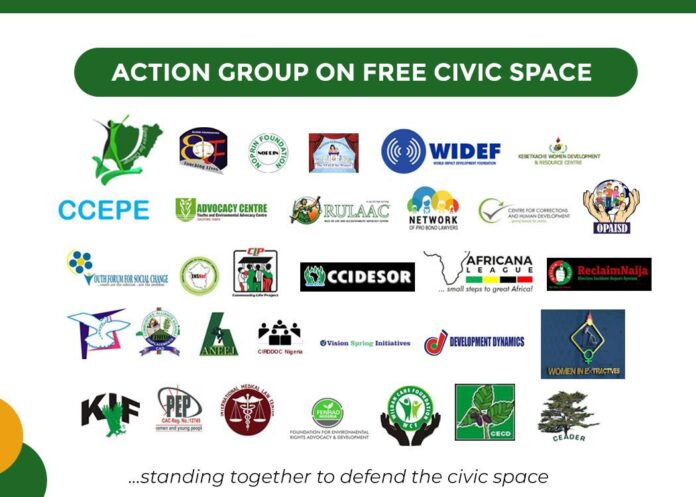By Ishaya Ibrahim, News Editor
A coalition of Civil Society groups under the auspices of Action Group on Free Civic Space, has revealed certain obnoxious provisions in the newly-introduced Companies and Allied Matters Act 2020.
At a press conference in Lagos, the Action Group argued that while not everything about the new CAMA is bad, certain provisions have negative consequences for non-profit organisations.
The Action Group noted that the new CAMA establishes a new form of eminent domain, empowering the government to suspend and remove the trustees of an association and taking over the administration or management of the association’s property and bank credits.
The groups said one of the problems with the new CAMA is that the trustees of a non profit that run foul of the law are by the new CAMA punished with removal without first allowing them to resolve the problem.
The groups said since trustees of a non-profit are not involved in the day to day running of the organisation, they ought to have been allowed to utilise whatever in-house mechanism available to them in resolving such problems before external interference.
Another problem the Action Group observed with the new CAMA is that the provisions are punitive in nature.
“They confer excessive powers on the government to overly restrict or interfere with NPO operations,” the groups said.
One of such powers is that the Corporate Affairs Commission is conferred with judicial powers, which ought to be exercised by the court.
“The Commission’s powers to unilaterally disrupt and displace the expressed intentions and aspirations of the members relegates the constitution or memorandum of an association, rendering it nugatory.
“By interfering with the rights of associations to associate and self-govern freely, Sections 838, 839 and 842 of CAMA 2020 contradict constitutionally-protected freedoms, particularly the freedom of association.
“The new functions of the Corporate Affairs Commission (the Commission) duplicate the roles of existing regulatory agencies charged with uncovering and punishing financial crimes such as the Special Control Unit Against Money Laundering (SCUML) and the Economic and Financial Crimes Commission (“EFCC”),” the Action Group said.
The groups said compliance with the new rules will be onerous, time-consuming, and possibly ineffective.
The Action Group also queried why the excessive Focus of the new CAMA is on properties of Associations.
“The fixation on sacking an association’s trustees and taking over the administration or management of an associations property and bank credits is deeply worrying. The entirety of S. 839 (6) represents a new form of eminent domain. Empowering the Commission to vest the association’s property in the hands of an official custodian, or order debtors to discharge their liabilities in an interest-yielding account held by the Commission for the benefit of the association, and to restrict the association’s transactions, essentially take away property rights just as much as an eminent domain does.
“The only difference is that the CAMA provisions allow the government, through the Commission, to evade the just compensation requirement through the trick of appointing interim managers.
The Action Group said the new CAMA empowers the Corporate Affairs Commission to dissolve an association with dormant bank accounts and transfer the amount standing to their credit to another or other associations.
“This provision interferes with the rights of members of an association to freely dispose of their assets upon dissolution. It also changes the rules that govern how owners can use or dispose of their property,” the groups said.
The groups said it is also wrong for the Commission to have the power of relegating the constitution of an Association and overriding their terms and conditions.
“These registered objects are rendered nugatory where the Commission can unilaterally discard them (in the public interest) and take over the affairs of an association, including imposing new trustees and managers, without the consent of the members of the association.
“Foisting interim managers and official custodians who do not share the same values and ideals with the members of an association, forces unlike minds to come together to run the affairs of the body amid glaring disparities in their vision, cultural perceptions, ideas, and common goals,” the groups said.
The Action Group said while the efforts of the Commission to introduce legal reforms aimed at easing the processes for running the affairs of corporate bodies is lauded, the duplicity of roles and overlapping regulatory powers hampers the development of democratic processes by encouraging the waste of scarce public funds, weakening existing institutions and creating excessively complicated administrative procedures for law enforcement.
“The recent revisions to CAMA are particularly reminiscent of the prescriptions of the rested 2016 NGO Bill sponsored by Umar Buba Jibril, which aimed to interfere with NGO assets,” the Action Group said.













